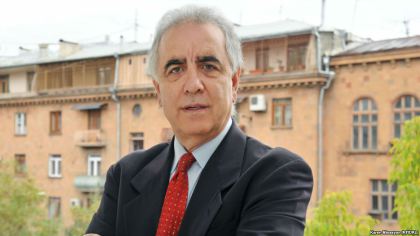By Harut Sassounian
Last week, I reported on Azerbaijan’s violations of religious freedom as documented in the most recent Annual Report of the United States Commission on International Religious Freedom (USCIRF). My article this week covers religious violations in Turkey as reported by USCIRF, a U.S. Federal government agency.
The Annual Report revealed that “in 2018, the state of religious freedom in Turkey remained deeply troubling, raising serious concerns that the country’s current trajectory will lead to the further deterioration of conditions in the year ahead. The lack of any meaningful progress on the part of the Turkish government to address longstanding religious freedom issues was continued cause for concern. Many serious limitations on the freedom of religion or belief continued, threatening the continued vitality and survival of minority religious communities in the country; in addition, increased demonization and a smear campaign by government entities and pro-government media contributed to a growing climate of fear among religious minority communities. The Turkish government continued to interfere in the internal affairs of religious communities, disallowing patriarchal elections for the Armenian Apostolic Church and maintaining its requirement that Greek Orthodox metropolitans obtain Turkish citizenship in order to participate in the church’s Holy Synod.”
Furthermore, the USCIRF stated that “followers of U.S.-based cleric Fethullah Gülen,” who was the political supporter of Pres. Recep Tayyip Erdogan earlier in his career, “continued to be dismissed from public service, detained, and arrested in the tens of thousands for alleged complicity in the July 2016 failed coup attempt or involvement in terrorist activity. The Turkish government has indiscriminately designated those affiliated with Gülen as part of a terrorist organization. Government officials also continued to engage in anti-Semitism in the form of public statements and comments made on social media platforms, while pro-government newspapers and media outlets propagated hate speech directed against both Christians and Jews.”
In the past three years, since the failed coup attempt of July 2016 to overthrow Pres. Erdogan, the Turkish government dismissed over 150,000 public servants, and arrested tens of thousands accusing them of plotting the coup and being involved in terrorism. In addition, 68 journalists — the most in any country — have been jailed, over 150 media outlets were closed down, and most independent media companies were controlled by the government.
Furthermore, the USCIRF reports the following religious violations in Turkey:
1) Students in public schools, including Alevis, are forced to take the Islamic course of “Religious Culture and Moral Knowledge.” Armenians, Greeks, Jews and atheists have been given exemptions. Students and their parents seeking exemption have to undergo a long arduous process or pursue their claims in court.
2) The Turkish government interferes in the internal affairs of both Greek and Armenian communities by restricting the ordination of clergy to Turkish citizenship. Since the Armenian Patriarch of Turkey was incapacitated in 2010, the Turkish government has not allowed the Armenian community to elect a new Patriarch.
3) “Alevis constitute the largest religious minority in Turkey [estimated 10 to 25 million]. However, the government has long classified Alevis as Muslim and subsequently failed to recognize them as a religious community distinct from majority Sunni Muslims. Despite a February 2015 ruling issued by the European Court of Human Rights, the government has yet to take steps to exempt Alevi students from attending compulsory religious classes that are based primarily on the Sunni understanding of Islam,” according to the USCIRF Annual Report.
4) There is widespread anti-Semitism in the pro-government print and social media. According to the Hrant Dink Foundation, there were 427 instances of anti-Jewish hate speech from January to April 2018. Turkish politicians also frequently make anti-Semitic comments.
5) The Protestant community also continued to be the target of hate speech. The European Court of Human Rights found Turkey violated the rights of the Foundation of Seventh-day Adventists. In addition, “Jehovah’s Witnesses are denied the right to conscientious objection to military service and face prosecution, fines, and imprisonment for the exercise of their beliefs,” USCIRF reported.
6) “The Armenian Patriarchate has been seeking the return of the Sanasaryan Han in Istanbul — a property previously used for the education of Armenian children — that the government seized in 1935. The Greek Orthodox Foundation on Bozcaada Island has also yet to receive the title deeds for 11 properties, despite a September 2014 decision rendered by the Council of Foundations to transfer the deeds. The Greek Orthodox Theological School of Halki, also known as Halki Seminary, has been closed and unable to educate or train clergy since 1971,” according to the USCIRF.
The USCIRF urged the US government to pressure Turkey to comply with all provisions of religious freedom and take appropriate corrective measures!





